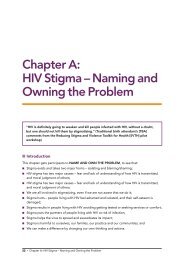Implementing Multiple Gender Strategies to Improve HIV and ... - ICRW
Implementing Multiple Gender Strategies to Improve HIV and ... - ICRW
Implementing Multiple Gender Strategies to Improve HIV and ... - ICRW
You also want an ePaper? Increase the reach of your titles
YUMPU automatically turns print PDFs into web optimized ePapers that Google loves.
• Project completion report: The following are select, gender-relevant<br />
findings from the report.<br />
- The report reviewed a study that was conducted <strong>to</strong> assess the<br />
effectiveness of peer educa<strong>to</strong>r education on soccer players. The<br />
study used a questionnaire <strong>and</strong> focus group discussions <strong>to</strong> compare<br />
the knowledge, attitudes <strong>and</strong> practices of the groups who attended<br />
these workshops <strong>to</strong> groups who had not. Results indicated that<br />
soccer players who attended peer education workshops showed<br />
significant reduction in number of sexual partners compared <strong>to</strong> the<br />
control group; a significant increase in regular use of condoms <strong>and</strong><br />
knowledge of the use of condoms; <strong>and</strong> increases in knowledge of<br />
STIs, their diagnosis <strong>and</strong> treatment <strong>and</strong> their impact on increased<br />
vulnerability <strong>to</strong> <strong>HIV</strong> infection. Also, there was a significant reduction<br />
in soccer players who reported having had an STI in the past two<br />
months. The control group did not show significant differences<br />
between pre-intervention test <strong>and</strong> post-intervention test (conducted<br />
two months after the intervention).<br />
- The report reviewed the third year of the project with respect <strong>to</strong> the<br />
level of communication between peer educa<strong>to</strong>rs <strong>and</strong> their partners<br />
in decision-making about sexual practices. Many peer educa<strong>to</strong>rs<br />
talked about increased communication with their partners on safer<br />
sex <strong>and</strong> sexuality. The report also reviews findings from a<br />
questionnaire <strong>and</strong> focus group discussions held with partners of<br />
three out of the eight groups of peer educa<strong>to</strong>rs, conducted in<br />
February 2001. Results showed that female partners of peer<br />
educa<strong>to</strong>rs had retained the information they had learned from the<br />
peer educa<strong>to</strong>rs: 93 percent reported that their partner had spoken <strong>to</strong><br />
them about <strong>HIV</strong> <strong>and</strong> AIDS, <strong>and</strong> 100 percent could cite three reasons<br />
for using condoms (prevention of <strong>HIV</strong>, STIs, <strong>and</strong> pregnancy). The<br />
survey also showed that 34 out of 44 partners indicated that they<br />
had increased communication about sexual issues, <strong>and</strong> 41 out of 44<br />
felt the training had improved their relationship. Information from<br />
focus group discussions with the partners also indicated that many<br />
peer educa<strong>to</strong>rs were initiating communication related <strong>to</strong> sexual<br />
matters.<br />
• Qualitative data collection: Findings indicate that community members,<br />
such as older men <strong>and</strong> traditional leaders, are seeking out soccer<br />
players involved in the project <strong>to</strong> learn about AIDS <strong>and</strong> <strong>HIV</strong> prevention.<br />
Young women also have been encouraged <strong>to</strong> form their own groups<br />
<strong>and</strong> now are educating other women <strong>and</strong> children. Some soccer<br />
players also report committing <strong>to</strong> ending drug <strong>and</strong> alcohol use <strong>and</strong><br />
setting an example of being drug-free for young people in the<br />
community.<br />
• Annual survey: Results are pending data collection <strong>and</strong> analysis.<br />
Replication <strong>and</strong><br />
Scale-up Activities<br />
• TAI has conducted training for two other organizations that work with<br />
young men so they can replicate select program activities.<br />
• Though similar models exist now, it is unclear <strong>to</strong> what extent they were<br />
influenced by the Shosholoza model.<br />
•<br />
136
















